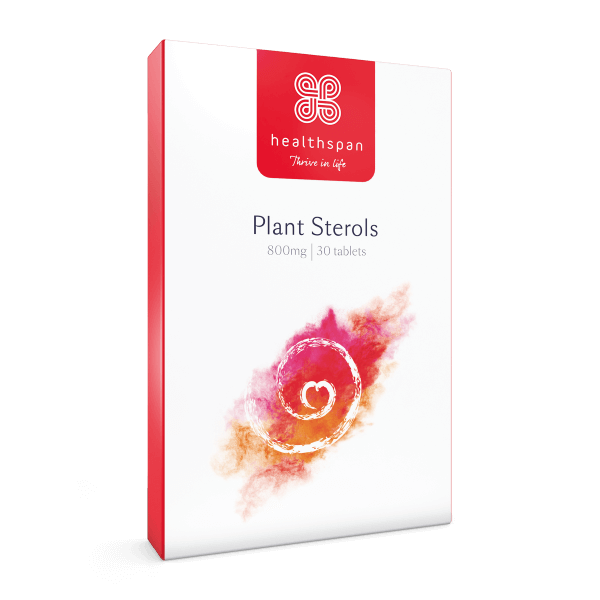High cholesterol is a risk factor for heart disease, and a link has recently been found with dementia. Find out what cholesterol is and how you can lower it with some lifestyle and diet changes.
🕒 6 min read
Lifestyle and dietary habits have a huge influence on cholesterol levels. So much so, there is a risk of developing cardiovascular disease or even dementia, so making changes such as exercising regularly, eating a balanced diet and avoiding smoking are essential.
According to statistics from Our Future Health, a test conducted between summer 2022 and June 2023 found that over half (119,651 out of 227,592 or 54%) of people tested were found to have high total cholesterol levels.
What is cholesterol?
Cholesterol is a waxy substance found in your blood and in your cells. Your liver makes most of the cholesterol in your body and the rest comes from foods you eat. Your body needs cholesterol to make hormones, vitamin D and digestive fluids, and for your organs to function properly.
There are two forms of cholesterol:
Low-density lipoprotein (LDL) is the unhealthy kind of cholesterol often referred to as 'bad'. LDL cholesterol can build up in your arteries and form fatty, waxy deposits called plaques.
High-density lipoprotein (HDL) is the healthy kind of cholesterol often referred to as 'good'. It transports excess cholesterol out of your arteries to your liver, which removes it from your body.
What happens if you have high cholesterol?
High cholesterol itself doesn't usually cause any symptoms, but it does increase your risk of serious health conditions. Over time, high levels of LDL cholesterol can damage your arteries, contribute to heart disease, and increase your risk of stroke.
To reduce your risk of serious health conditions related to high cholesterol, we would recommend rethinking the following factors:
- Healthy diet: keeping a healthy diet is important for reducing your risk of high cholesterol. Try to avoid foods which is rich in saturated fat and sugar.
- Smoking: there is one particular chemical found in cigarettes called acrolein which stops HDL from functioning properly, which can lead to the narrowing of arteries (atherosclerosis)
- Exercise: being overweight and not exercising affects the fats that circulate in the bloodstream. Carrying excess weight can increase levels of LDL cholesterol while being inactive can depress protective HDL cholesterol. Maintaining a healthy weight and exercising can reverse these effects.
- Family history: check with family members to see if there has been a past with health conditions revolving around high cholesterol.
Read more: What you need to know about cholesterol and how to lower it
Everything you need to know about cholesterol, including what it is and how to tell the good from the bad.
Read more
Food substitutes that reduce cholesterol
Certain foods have been shown to reduce cholesterol, and can be used alongside medication or as a natural way to reduce your cholesterol levels. Different foods work in different ways to lower cholesterol by the effect of soluble fibre (removes LDL cholesterol from the body), unsaturated fats (rebalance cholesterol levels) and plant sterols, which block the body from absorbing cholesterol.

Plant Sterols 800mg
Shown to maintain or lower cholesterol
- Blocks the absorption of dietary cholesterol
- One tablet a day maintains normal cholesterol levels
- Three tablets a day (2.4g) lowers cholesterol levels
Substitute breakfast cereal for oats
Fibre is an important part of the diet, and many people don't get enough. The average intake of fibre in the UK is just two-thirds of the recommended 30g per day (which only 9% of men and 4% of women achieve).
Soluble fibre is particularly beneficial as it dissolves in the gut to form a thick paste that binds with cholesterol and cholesterol-like substances, preventing them from being absorbed. Studies suggest that eating 3g of oat beta-glucan per day (2-4 portions of oat-based foods) may help to reduce LDL cholesterol by 5-10% over 4 weeks.1
Swap your usual cereal for something oat-based. Oats can be used to make porridge or soaked oats, and granola is a tasty option to top yoghurt. You can also add oats to breakfast smoothies or prepare a batch of overnight oats, ready for the day ahead.
Substitute cow's milk for soya milk
Foods such as tofu, edamame beans and soy milk all contain soy protein, which is often regarded as helping to lower cholesterol and is a key part of the Portfolio diet. It is thought that consuming up to 25g of soy protein per day help to lower LDL cholesterol by up to six percent.2
Try switching cow's milk for a soy alternative to increase your intake of soy protein. This alternative can be used in the same way as milk. Look for a brand that is fortified with calcium.
Substitute a chocolate bar for dried fruit and nut bar
Chocolate is high in saturated fat, which can increase levels of LDL cholesterol if eaten in excess. Dried fruit and nut bars contain less saturated and more monounsaturated fats found in nuts.
Monounsaturated fats help to lower LDL cholesterol and increase HDL cholesterol. Various studies have shown how nuts including almonds, peanuts and walnuts in your diet (50g per day) can slightly lower LDL cholesterol by up to five percent.3
Dried fruits also have heart-healthy properties, as sultanas and raisins contain resveratrol, which is a polyphenol antioxidant thought to be associated with good heart health. Their soluble fibre content also helps to lower cholesterol by binding in the gut.
Substitute cream for low-fat yoghurt
Cream is another food that is high in saturated fat, which can increase your levels of LDL cholesterol. Saturated fat is not all bad, and it helps to lower triglycerides and nudge up levels of HDL cholesterol when eaten in moderation.
The role of saturated fat in heart disease is a topic that is often under debate, but limiting your saturated fat intake will help to maintain a healthy body weight.
Switching to low-fat yoghurt over cream is a simple food swap that can be used in the same way when cooking. You can flavour yoghurt with spices such as cinnamon, vanilla or lemon juice, which makes a nice accompaniment to fruit or fruit-based puddings.
Substitute butter for low-fat spread fortified with plant sterols, such as Benecol
Plant sterols are extracted from plant gums, and have been shown to help lower LDL cholesterol by inhibiting it from being absorbed in the body. These compounds are now added to many foods including spreads, milk, orange juice and yoghurt. has shown that consuming 2g of plant sterols per day can lower LDL cholesterol by around ten percent.4
Try swapping butter for a lower-fat spread fortified with plant sterols. Plant sterols are also available as a supplement.
Substitute red meat for oily fish
Oily fish such as salmon, mackerel and trout are rich in omega-3 fatty acids. These fats can help to increase HDL cholesterol and reduce LDL cholesterol, as well as reduce triglycerides in the bloodstream. Swapping out red meat for oily fish means that you are not only increasing your omega-3 intake, but are cutting back on saturated fat.
High cholesterol is a risk factor for many health problems, but by changing the way you eat and adopting healthy lifestyle habits, you can reverse the risk and improve your cholesterol balance.
Supplements to help lower cholesterol
If you’re dealing with high cholesterol levels, including the above food substitutes within your diet could help reduce the impact. However, if your cholesterol levels need more attention, there are a few supplements which can help. Healthspan has cholesterol and heart supplements that have been scientifically shown to reduce cholesterol levels and reduce the risk of coronary heart disease development.







